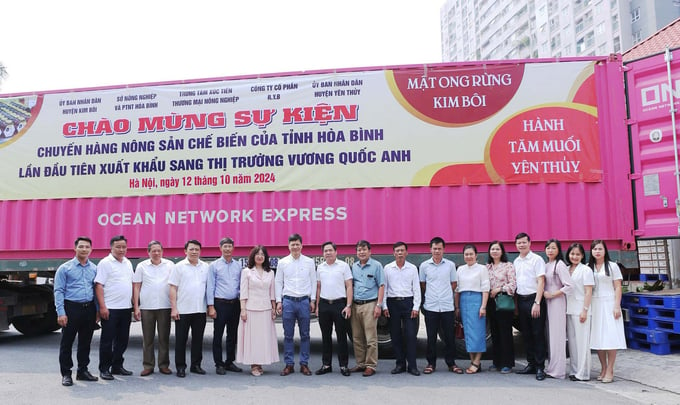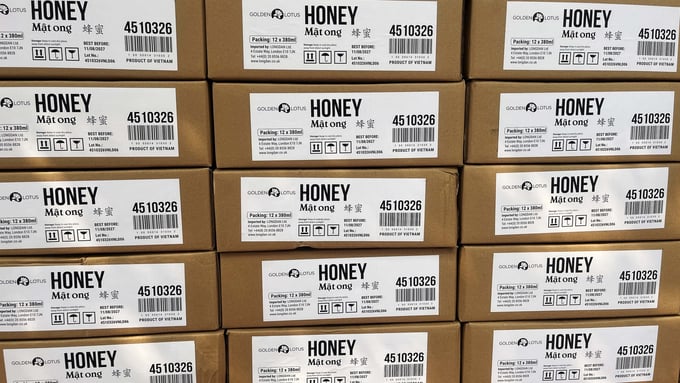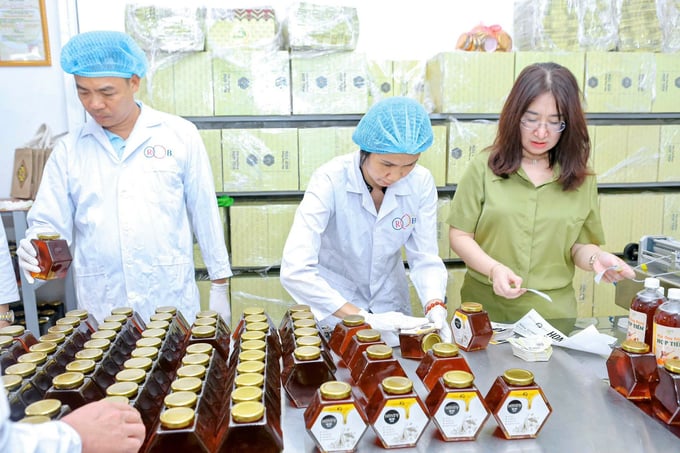May 20, 2025 | 00:37 GMT +7
May 20, 2025 | 00:37 GMT +7
Hotline: 0913.378.918
May 20, 2025 | 00:37 GMT +7
Hotline: 0913.378.918
The Department of Agriculture and Rural Development, the People's Committee of Kim Boi District, Yen Thuy District, Hoa Binh Province, in collaboration with R.Y.B Joint Stock Company, organized an event for the first time to export processed agricultural products to the United Kingdom, including Yen Thuy pickled shallots and Kim Boi forest honey.
To prepare for this export shipment, the Department of Agriculture and Rural Development of Hoa Binh Province worked closely with the People's Committees of Yen Thuy and Kim Boi Districts to guide and support production facilities in standardizing raw material areas and improving processing techniques to meet the requirements of the UK market.

The processed agricultural product shipment from Hoa Binh Province is being exported to the UK market for the first time. Photo: R.Y.B.
The honey product making its debut in the UK market this time is from Green Life Cooperative. Since 2017, the cooperative has established a specific production orientation to help its members standardize technical care, harvesting, and packaging. The production process follows VietGAP standards for farming and ISO 22000 standards for processing.
Although the quantity is not large, it is considered an important milestone for OCOP products from Hoa Binh in general and honey in particular, marking their presence in one of the most demanding markets.
R.Y.B Company is responsible for packaging the export goods to meet export standards and for transporting them to the importing market.
Through surveys and testing, the company has highly evaluated the quality of OCOP products from Hoa Binh. Among them, the Kim Boi forest honey is expected to be a highly competitive product in the UK market due to its thick consistency and the unique flavor of wildflowers.
To successfully export the first batch of honey to the UK market, R.Y.B Company invested over a year negotiating with partners and making necessary adjustments to their production, processing, and packaging methods to align with UK standards and regulations. This inaugural shipment of honey comes from the natural forests of Thuong Tien in Kim Boi District.
"The UK is known for being a challenging market, with stringent rules regarding plant quarantine, food safety management, and product traceability. However, if we can seize this opportunity and consistently provide high-quality products that meet these stringent requirements, the future for expanding into this market looks very promising", shared Nguyen Thanh Huong, the CEO of R.Y.B Company.
Data from previous years indicates that the EU remains the largest global customer for honey, accounting for 22% of total worldwide consumption. Among EU countries, Germany leads with 23% of the total honey consumed in Europe (approximately 85.000 tons), followed by the UK with around 12% and France with 10%.
At the beginning of 2024, the Vietnam Trade Office in the EU reported that the European Parliament and the Council of the EU reached an agreement to review and strengthen existing marketing standards for honey, fruit juices, jams and milk by the end of January 2024.

The first batch of honey from Kim Boi, Hoa Binh, has been exported to the United Kingdom. Photo: Tran Anh.
The directive, referred to as the Breakfast Directives, sets forth comprehensive rules concerning the ingredients, product names, labeling, and presentation of these products. Its primary goal is to facilitate the free movement of goods within the European Union (EU) market while empowering consumers to make informed decisions about their purchases.
As reported by the Vietnam Trade Office in Belgium, Luxembourg, and the EU, this amended directive has garnered agreement from co-legislators and will implement several significant changes. Notably, it will require mandatory labeling of the origin of honey. For blended honey products, the countries of origin must be listed on the label in descending order, reflecting the percentage of each source.
Member countries will have the flexibility to require percentage disclosures for the four largest components of honey blends when these account for over 50% of the mixture. For packages weighing less than 30 grams, the country of origin must be indicated bt abbreviating it using a two-letter ISO abbreviation.
Furthermore, the Commission has been granted authority by lawmakers to develop a harmonized analytical method specifically designed to detect honey that has been adulterated with sugar. This standardized method is intended to trace the origin of honey effectively and establish criteria that ensure honey products are not fraudulently marketed to end consumers. In addition to these measures, the EU has also established a working group focused on combating honey fraud and trade-related deception.

Honey for export is thoroughly inspected before being packaged. Photo: R.Y.B.
Honey imported into the UK and the EU is widely utilized for a variety of purposes, particularly within the food and beverage sector. It serves as a natural sweetener in products such as candies and soft drinks, and is frequently incorporated into recipes for cooking and seasoning dishes.
In addition to its culinary uses, honey is also an important ingredient in various health-related products. It is commonly found in cough syrups, dietary supplements, and nutritional products.
Due to its antibacterial and moisturizing properties, honey has become a widely sought-after ingredient in a variety of cosmetic and skincare products. It is commonly found in items such as moisturizers, face masks, and shower gels, where it helps to hydrate the skin and provide a soothing effect.
In addition to its cosmetic uses, honey plays a significant role in the pharmaceutical industry. It is utilized in the production of various medicines and natural treatment products.
Moreover, certain types of honey are also employed in scientific research and the development of new products, especially in the fields of medicine and biotechnology.
Utilize strong and healthy bee breeds that have demonstrated resistance to diseases and the ability to produce high honey yields. It is essential to ensure that the density of bee colonies is suitable for the area being cultivated. Regular inspections should be conducted to monitor the well-being of the colonies, and queen bees should be replaced as needed to maintain both the health and productivity of the hive.
In addition, it is crucial to provide sufficient food and clean drinking water for the bees, particularly during seasons when floral resources are scarce. Furthermore, it is important to avoid using feed that contains harmful chemicals.
Implement timely disease prevention and treatment measures for the bees. Use safe medications and methods that do not harm the health of the bees or the quality of the honey.
Harvest honey at the right time to ensure that it reaches optimal ripeness and high quality. Employ clean harvesting and storage tools to prevent contamination of the honey.
Register and comply with international quality standards such as HACCP, ISO, or the specific standards required by the export market.
Conduct quality testing of the honey before export to ensure it meets market requirements.
Honey exported to the UK must meet several basic criteria
- The honey must have an attractive color, be free of crystallization, and maintain a thick consistency. Its moisture content must be below 17% to ensure quality.
- The honey must undergo quarantine and possess a quarantine certificate from veterinary authorities. This certificate should confirm the level of Chloramphenicol as required by the customer.
- The product must clearly indicate its origin to ensure traceability and prevent counterfeiting or adulteration with sugar.
- The production and processing of the honey must comply with international standards such as VietGAP and ISO 22000.
Translated by Phuong Linh

(VAN) On May 15, Ministry of Agriculture and Environment of Vietnam hosted the 'Connecting Vietnam - Germany agricultural, forestry and fishery trade' seminar in Berlin, Germany.

(VAN) In the face of counterfeit and imitation products, Khanh Hoa Salanganes Nest Company hopes for the prompt completion of the legal framework, strict enforcement against violations, and protection of the bird’s nest brand.

(VAN) Japan's efforts to lower the price of rice through the release of its stockpile may finally be making some progress, albeit at a snail's pace.

(VAN) U.S. tariffs are not only a 'shock', but also an opportunity for Vietnamese businesses to renew their mindset toward comprehensive development.

(VAN) As Bac Giang lychee enters the harvest season, Minister Do Duc Duy expects that the fruit will contribute greatly to agricultural exports due to standardized production and deep processing.

(VAN) Consumers have shown a preference for free-range eggs, but those farming systems are more vulnerable to biosecurity risks like bird flu.
/2025/05/09/5701-1-184335_301.jpg)
(VAN) Vietnam’s eel exports nearly doubled thanks to a mud-free farming model, opening up new prospects while still facing numerous barriers related to international standards.